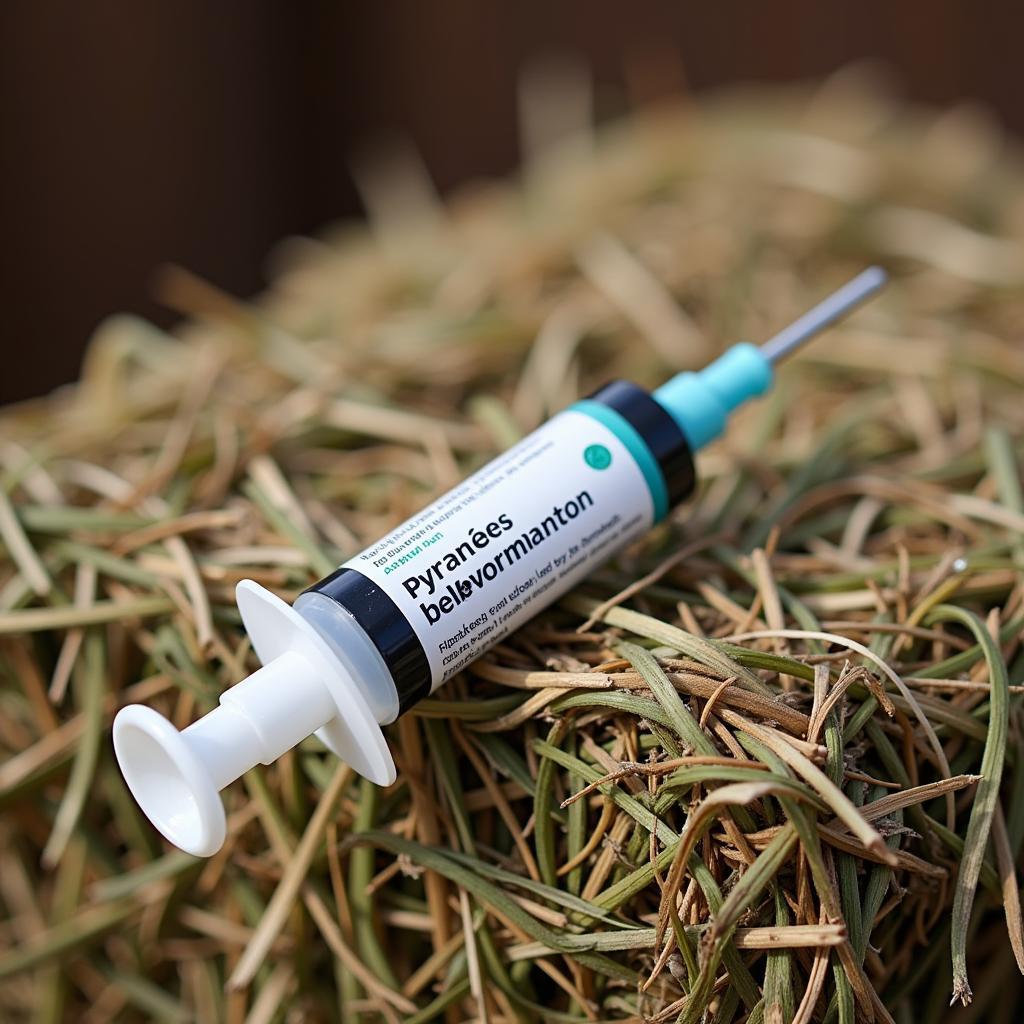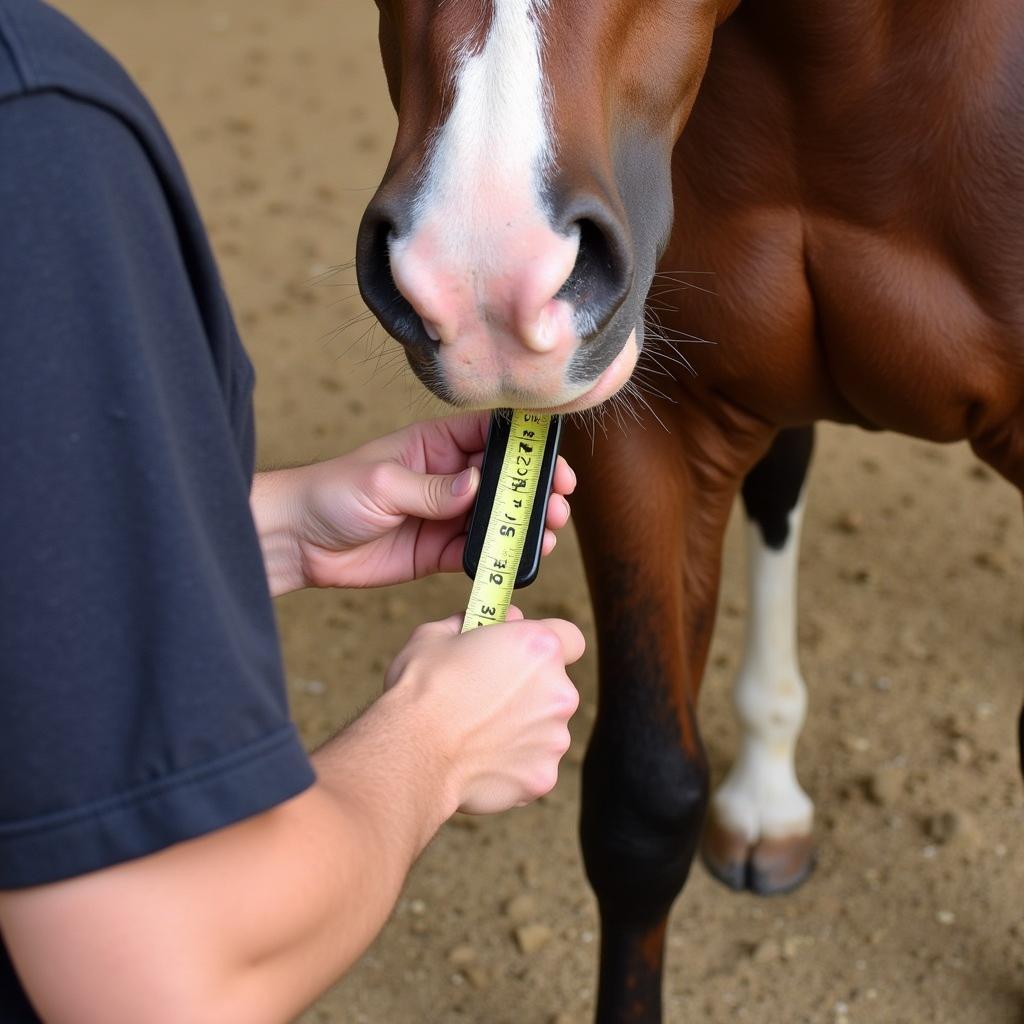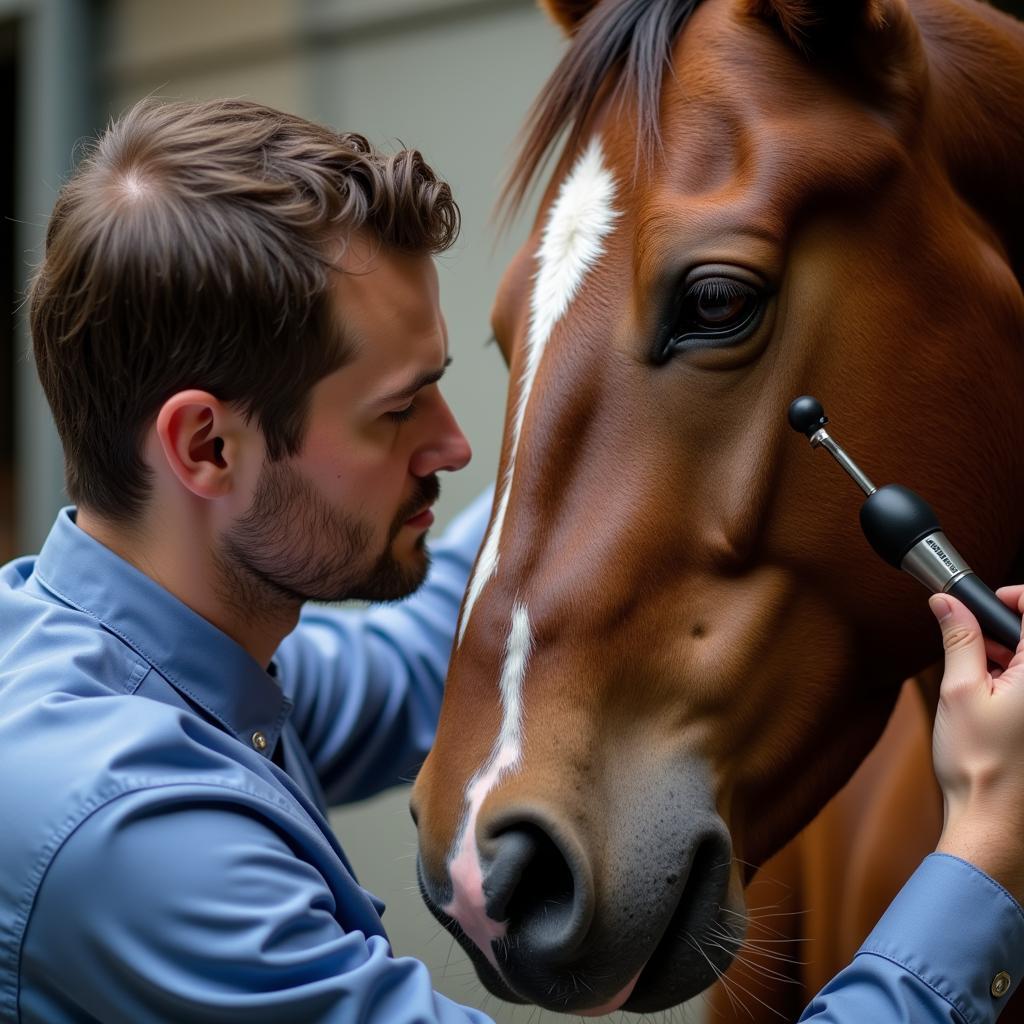Pyrantel pamoate is a common and effective dewormer used for horses of all ages. This medication helps eliminate a variety of internal parasites that can negatively impact your horse’s health, comfort, and performance. This comprehensive guide will provide horse owners with valuable information about Pyrantel For Horses, covering its uses, dosage, administration, and safety precautions.
Understanding Pyrantel for Horses
Pyrantel pamoate is an anthelmintic, also known as a dewormer. It belongs to the tetrahydropyrimidine class of drugs and works by paralyzing certain parasites within the horse’s digestive system. This paralysis prevents the worms from feeding and reproducing, ultimately leading to their expulsion from the horse’s body.
 Pyrantel Pamoate Dewormer for Horses
Pyrantel Pamoate Dewormer for Horses
What Parasites Does Pyrantel Treat in Horses?
Pyrantel for horses is effective against various internal parasites, including:
- Strongyles (bloodworms): These parasites are highly prevalent in horses and can cause significant damage to the horse’s gut lining, leading to colic, weight loss, and anemia.
- Ascarids (roundworms): Primarily affecting foals and young horses, ascarids can lead to stunted growth, pot-bellied appearance, and respiratory problems.
- Pinworms: These parasites irritate the area around the horse’s rectum, causing tail rubbing and discomfort.
Pyrantel Dosage for Horses
It’s crucial to administer the correct dosage of pyrantel to ensure its effectiveness and safeguard your horse’s health. The standard dosage for pyrantel pamoate in horses is 6.6 mg per kilogram of body weight. This translates to approximately 14.5 mg per pound of body weight.
Always consult your veterinarian to determine the appropriate dosage for your horse. They will consider factors such as the horse’s age, weight, health condition, and the severity of the parasitic infection.
 Measuring Horse Weight with a Tape
Measuring Horse Weight with a Tape
How to Administer Pyrantel to Horses
Pyrantel for horses typically comes in paste form, making it relatively easy to administer. Here’s a step-by-step guide:
- Wear gloves to protect yourself from accidental ingestion.
- Determine the correct dosage based on your horse’s weight and your veterinarian’s recommendations.
- Remove the cap from the syringe and adjust the ring to the prescribed dosage mark.
- Insert the syringe into the horse’s mouth at the interdental space (the gap between the front teeth and the cheek teeth) and depress the plunger to deposit the paste onto the back of the horse’s tongue.
- Hold your horse’s head up for a few seconds to encourage swallowing and prevent spitting out the paste.
Potential Side Effects of Pyrantel in Horses
Pyrantel for horses is generally safe and well-tolerated. However, some horses may experience mild and transient side effects such as:
- Loss of appetite
- Mild colic
- Diarrhea
Contact your veterinarian immediately if you observe any severe or persistent side effects after administering pyrantel to your horse.
Precautions and Contraindications for Using Pyrantel in Horses
While generally safe, there are certain precautions and contraindications associated with using pyrantel for horses:
- Pregnant or lactating mares: Consult your veterinarian before administering pyrantel to pregnant or lactating mares, as the safety of the drug during these stages has not been fully established.
- Horses with liver disease: Use caution when administering pyrantel to horses with liver disease, as it is metabolized in the liver.
- Hypersensitivity: Horses with known hypersensitivity or allergic reactions to pyrantel pamoate should not be given this medication.
 Veterinarian Performing a Check-Up on a Horse
Veterinarian Performing a Check-Up on a Horse
Importance of Deworming Your Horse
Regular deworming is crucial for maintaining your horse’s health and preventing parasitic infections. Internal parasites can lead to a variety of health problems in horses, impacting their overall well-being and performance.
Here are some reasons why regular deworming is essential:
- Prevents health issues: Deworming protects your horse from the harmful effects of internal parasites.
- Improves nutrient absorption: Parasites compete with your horse for nutrients, leading to deficiencies and affecting growth and performance.
- Reduces the spread of parasites: Regular deworming helps control parasite populations, reducing the risk of spreading them to other horses.
Developing an Effective Deworming Program
Consult with your veterinarian to develop a comprehensive deworming program tailored to your horse’s specific needs and your geographical location. This program will likely involve:
- Fecal egg counts: Regular fecal examinations help determine the type and burden of parasites present in your horse, guiding deworming decisions.
- Strategic deworming: This approach involves rotating dewormers with different modes of action to prevent parasite resistance.
- Pasture management: Implementing good pasture management practices, such as manure removal and rotational grazing, can help minimize parasite exposure.
Frequently Asked Questions About Pyrantel for Horses
1. Can I give pyrantel to my pregnant horse?
It’s best to consult your veterinarian before giving any medication, including pyrantel, to a pregnant horse. They can assess the risks and benefits and advise you on the best course of action.
2. How often should I deworm my horse with pyrantel?
The frequency of deworming depends on various factors, including your horse’s age, living conditions, and the prevalence of parasites in your area. Your veterinarian can create a personalized deworming schedule based on your horse’s needs.
3. Can pyrantel be used with other dewormers?
Yes, pyrantel can be used in combination with other dewormers, but it’s crucial to follow your veterinarian’s instructions carefully.
4. What should I do if my horse vomits after taking pyrantel?
If your horse vomits shortly after taking pyrantel, contact your veterinarian immediately.
5. Where can I purchase pyrantel for my horse?
You can purchase pyrantel for horses from your veterinarian or a reputable online pet pharmacy.
Seeking Professional Veterinary Advice
This guide provides general information about pyrantel for horses. However, it’s essential to remember that every horse is different and may require individualized care.
For personalized advice and guidance on using pyrantel for your horse, always consult with your veterinarian. They can provide tailored recommendations based on your horse’s specific needs and health status.
Looking for More Information on Equine Health?
Check out these related articles on our website for more insights into horse care:
Need help with your horse’s health or have additional questions? Don’t hesitate to reach out! Our dedicated team at Justus Horses USA is here to provide support and guidance. Contact us at:
Phone Number: 0772127271
Email: [email protected]
Address: QGM2+WX2, Vị Trung, Vị Thuỷ, Hậu Giang, Việt Nam.
We offer 24/7 customer support for all your equine needs.